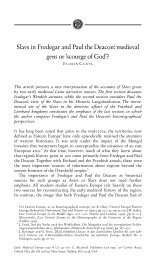A READER IN COMPARATIVE INDO-EUROPEAN MYTHOLOGY
A READER IN COMPARATIVE INDO-EUROPEAN MYTHOLOGY
A READER IN COMPARATIVE INDO-EUROPEAN MYTHOLOGY
Create successful ePaper yourself
Turn your PDF publications into a flip-book with our unique Google optimized e-Paper software.
was full of divinity, or, as Virgil says (Georg. IV, 221f.) „God passes throught all lands, all<br />
tracts of sea and the depths of the sky“.<br />
The chief god of the Roman pantheon, and the head of the Capitoline Triad is Jūpiter (or<br />
Juppiter); his name is actually from the PIE phrase *dyēws ph2tēr „father Sky“ (see above);<br />
his consort, Jūno, bears the name of Etruscan Uni, but perhaps it is originally from the PIE<br />
root *dyew-/*diw- „sky“ (Lat. deus 'god', Gr. Zeús, see above); if her original name was<br />
*Diwō (Gen. *Diwōn-es), it can be compared to Gr. Diṓ nē, who was also the original wife of<br />
Zeus. In that case, the name of Iuno must have been borrowed in Latin through some<br />
intermediary language, since it is never written as *Diuno, even in the archaic monuments.<br />
Another etymology relates her name to Lat. iuvenis 'young' and interprets it as 'the young<br />
wife'; she would have been the woman's counterpart to the genius, the personal spirit of every<br />
man. In her epiphany as Iuno Lucina she was especially worshipped as the goddess of birth<br />
(parallel to Gr. Eileithya). The somewhat obscure god Quirīnus was an agricultural deity<br />
whose name is easily derived from *co-virīnus (from vir < PIE *wiHro- 'man', Skr. vīrás,<br />
Lith. výras). He was originally the protector of the community, cf. also cūria < *co-viria.<br />
Besides Juppiter and Quirinus, the third member of the Capitoline Triad was Mārs, who was<br />
rather clumsily identified with Gr. Ares. He was also originally an agricultural deity rather<br />
than the god of war. His name is known in its older forms Mavors, Māmers, and Marmar,<br />
and, unsurprisingly, it is of unknown origin. The name of Venus is originally an abstract<br />
numen, from the neuter *wenos „desire, lust“, Skr. vánas. She was identified with Gr.<br />
Aphrodite, and the name of Apollo was directly borrowed from Greek). The god of trade and<br />
the protector of roads, Mercurius, was likewise originally an abstract numen, and his name<br />
was derived from merx „commerce“, of unknown, perhaps Etruscan origin). The two-faced<br />
god Jānus, who protected the entrances of Roman houses and the beginnings of all endeavors,<br />
bears the name identical to the noun iānus, „arched passage, doorway“ < PIE *yeh2-no-, cf.<br />
Skr. yā́ ti „goes“, Lith. jóti „ride“). The name of Minerva, the goddess of wisdom (identified<br />
with Athena) was probably borrowed from Etruscan; in that language, it could also be a<br />
borrowing from some IE dialect. It might ultimately be from *Mēneswā, a derivative of PIE<br />
*meh1nos- „moon“, Lith. mė́nuo, or from PIE *menos „mind“ (Ved. mánas). The name of<br />
Saturnus is of unknown origin, though it is sometimes compared to Ved. Savitár- (see above),<br />
and the name of the wild forest divinity Faunus is also unclear; it is sometimes derived from<br />
*b h h2u-no-, from the root „to be, become“. The goddess of the hearth, Vesta, is of course<br />
identical to Gr. Hestía (see above), and Līber is from PIE *h1lewd h ro- „free (man)“ (OCS<br />
ljudьje, Germ. Leute, etc.). The god of the blacksmiths Volcanus bears the name of unknown<br />
origin. It may have been derived from the Etruscan gens Volca, if he was originally their<br />
protector deity. Tellus, of which little is known from classical sources, may have been the<br />
original Roman Terra Māter, 'Mother Earth' (Virgil calls her prima deorum in Aen. 7.136).<br />
Her name is, of course, the normal Latin word for 'earth, ground' < PIE *telh2- 'ground' (Skr.<br />
tala- 'surface, bottom', ORuss. tьlo, OIr. talam 'ground'). She is often identified with Cerēs,<br />
the goddes of grain and fruits (from *k'erH- 'nourishment', Lith. šérti 'feed', OHG hirso<br />
'millet'). The name of the protectors of the household (in particular of the hearth) was Lāres <<br />
Lāses in Carmen saliare. It is of unknown origin, but perhaps from PIE *deh2-s- „divide,<br />
apportion“). The other household deities, the Penātēs, have the name derived from penus,



